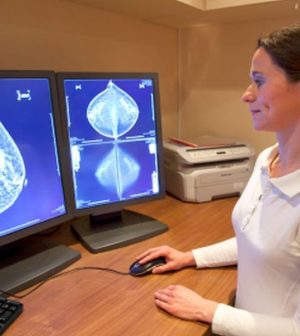- Recognizing the Signs of Hypothyroidism
- 10 Strategies to Overcome Insomnia
- Could Artificial Sweeteners Be Aging the Brain Faster?
- Techniques for Soothing Your Nervous System
- Does the Water in Your House Smell Funny? Here’s Why
- Can a Daily Dose of Apple Cider Vinegar Actually Aid Weight Loss?
- 6 Health Beverages That Can Actually Spike Your Blood Sugar
- Treatment Options for Social Anxiety Disorder
- Understanding the Connection Between Anxiety and Depression
- How Daily Prunes Can Influence Cholesterol and Inflammation
How the Pandemic Changed Breast Cancer Care

As the COVID-19 pandemic unfolded, breast cancer experts realized space in operating rooms and hospitals could become scarce. That meant rethinking standard care, to provide the best way to treat patients under these suddenly restricted conditions.
One of the new ideas: Reverse the order of care given to patients with a type of breast cancer known as estrogen receptor-positive (ER+). ER+ cancer is a common type of breast cancer and generally has a good outlook.
Instead of getting medication known as neoadjuvant endocrine therapy (NET) after surgery, as is more common, patients would receive NET first and surgery later, because ORs were so scarce. And because doctors didn’t know how long the postponement in surgeries might last, they set up a system to track what was happening to women who affected by the delays across the United States.
Study leader Dr. Lee Wilke said her team wanted to “catalog across the country how long did patients get their surgery postponed or their treatment postponed, and what mechanisms did surgeons use to try and make sure that they were still able to treat their patients in an effective manner.” Wilke is professor of surgery at University of Wisconsin School of Medicine and Public Health, in Madison.
The preliminary findings were presented Sunday at an online meeting of the American Society of Breast Surgeons (ASBrS). Research presented at meetings is typically considered preliminary until published in a peer-reviewed journal.
Treating cancers in this way was part of an effort by the breast surgeons’ group and other cancer societies to develop treatment guidelines for times when access to operating rooms is limited.
Doctors also developed a series of options to further evaluate patients, Wilke said. This included testing for gene mutations in a tumor’s DNA to determine which patients needed chemotherapy.
Patients who needed standard approaches still got them, Wilke said. For example, women with aggressive triple negative and HER2+ tumors were still treated with chemotherapy.
Data used in the study came from nearly 4,800 patients listed in the registry starting in March 2020. In all, 172 breast surgeons entered information in the registry.
Due to COVID-19, NET was used to treat an additional 554 patients (36%) who would otherwise have had surgery first between March 1 and Oct. 28, 2020, the study found. Later results through March 2021 put the total at 31%.
NET was also used in 6.5% to 7.8% of patients in the registries who would typically have had this treatment, the study authors said in an ASBrS news release.
The patterns found in the registry are what cancer experts discussed early in the pandemic, said Dr. Tari King, chief of breast surgery at Dana-Farber/Brigham and Women’s Cancer Center in Boston, who was not involved in the study.
“We had good data to support that this would be a reasonable strategy for the majority of patients coming in with ER+ breast cancer, that we could use this as a bridge to surgery without negatively impacting their outcomes,” King said.
Several clinical trials had already validated the approach, which is more common in Europe.
Anti-estrogen endocrine therapy blocks or decreases the ability of hormones to grow certain types of cancer cells. In the United States, it is typically used in postmenopausal women with larger tumors, Wilke said.
The study also found that there were fewer immediate breast reconstruction surgeries because shorter operating times prioritized cancer removal.
About 24% of patients had testing for genetic mutations on biopsied tumor tissue, the study found.
Dana-Farber/Brigham and Women’s Cancer Center was already using core biopsy for these genomic studies to determine which women needed chemotherapy prior to surgery, King said.
In places like Boston, cancer treatment returned to normal in the late fall, she noted.
King said many of the patients who started on preoperative endocrine therapy at the center didn’t stay on the treatment as long as they normally would have if the goal had been to shrink the tumor, because they were already candidates for a lumpectomy.
Though this treatment change was temporary, King said it challenges researchers to think more broadly about which patients may benefit from NET in the future. It shrinks tumors as well as chemo, but it takes longer to do so, she said.
“But certainly neoadjuvant endocrine therapy has far fewer side effects, far less toxicity than chemotherapy does,” King said. “I think it does push us to think about using it more broadly when we’re trying to shrink an ER+ tumor if the patient is otherwise not a candidate for chemotherapy.”
Wilke added that it may take three to five years to understand the full impact of the changes stemming from the pandemic. Some of the new protocols may continue.
More information
The American Cancer Society has more about breast cancer.
SOURCES: Lee Wilke, MD, professor, surgery, University of Wisconsin School of Medicine and Public Health, and director, UW Health Breast Center, Madison; Tari King, MD, chief, breast surgery, Dana-Farber/Brigham and Women’s Cancer Center, professor, surgery, Harvard Medical School, and associate chairwoman, multidisciplinary oncology, Brigham and Women’s Hospital, Boston; American Society of Breast Surgeons, annual meeting, May 2, 2021, online presentation
Source: HealthDay
Copyright © 2026 HealthDay. All rights reserved.










